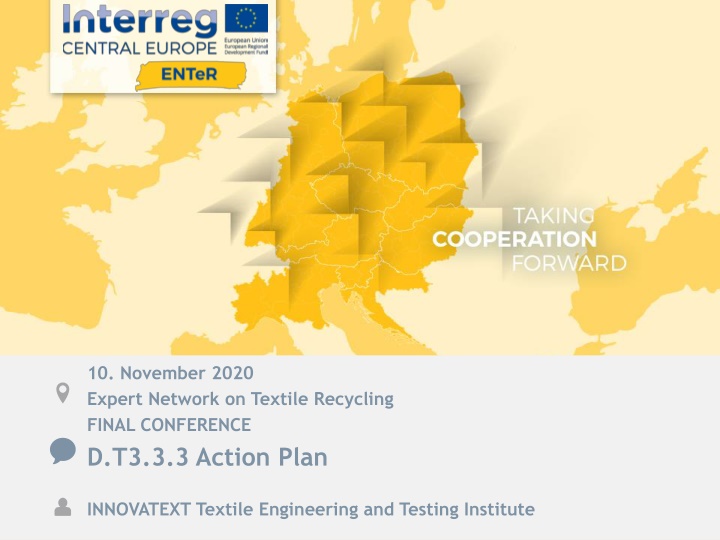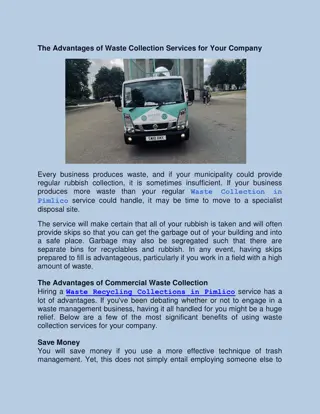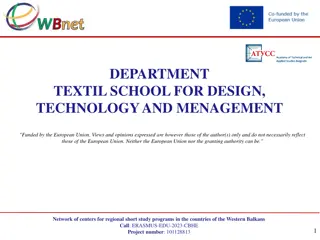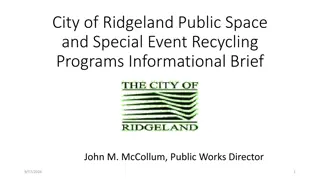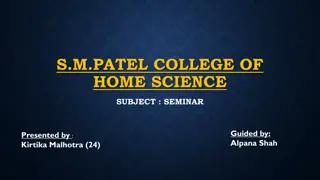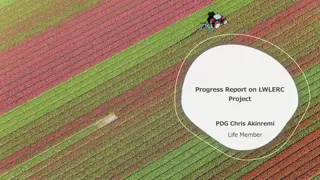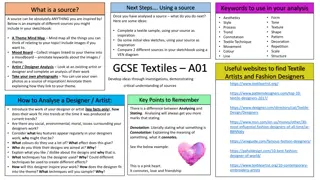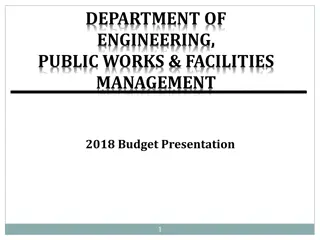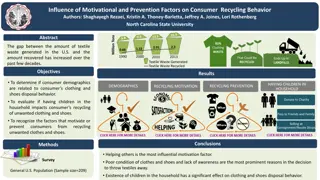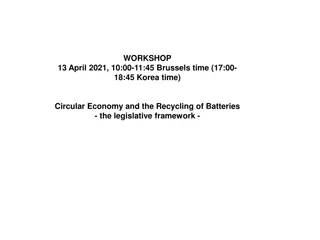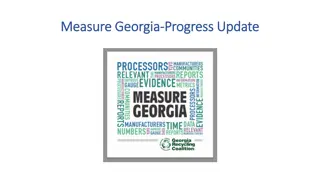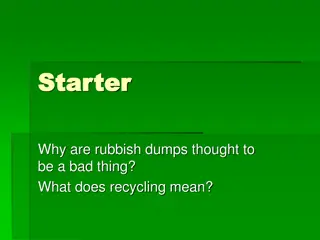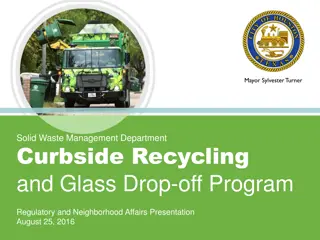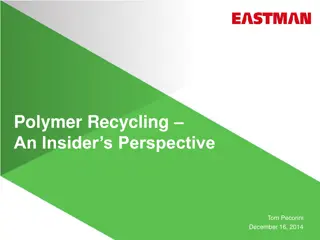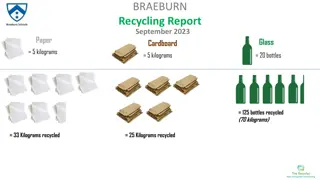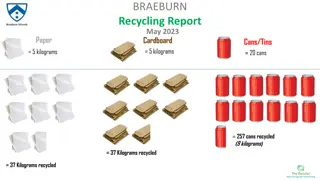Expert Network on Textile Recycling: Action Plan for Innovation in Textile Engineering
"Explore the strategies and objectives outlined for advancing textile recycling efforts, including waste management, legal policies, education, research, and technology trends. The plan focuses on critical factors, actions, and milestones to drive cooperation in the textile industry."
Download Presentation

Please find below an Image/Link to download the presentation.
The content on the website is provided AS IS for your information and personal use only. It may not be sold, licensed, or shared on other websites without obtaining consent from the author.If you encounter any issues during the download, it is possible that the publisher has removed the file from their server.
You are allowed to download the files provided on this website for personal or commercial use, subject to the condition that they are used lawfully. All files are the property of their respective owners.
The content on the website is provided AS IS for your information and personal use only. It may not be sold, licensed, or shared on other websites without obtaining consent from the author.
E N D
Presentation Transcript
10. November 2020 Expert Network on Textile Recycling FINAL CONFERENCE D.T3.3.3 Action Plan INNOVATEXT Textile Engineering and Testing Institute
WHAT? OBJECTIVES STEPS for a STRATEGY what by whom when funding SPECIFIC TASKS 2 TAKING COOPERATION FORWARD
WHY? Goal Define future steps and possibilities Strategic approach For the next 3 to 5 years Future of our work Based on project achievements 3 TAKING COOPERATION FORWARD
LINES OF ACTION Waste Management Legaland Policies Area Education Research Trends and Technologies Communication 4 TAKING COOPERATION FORWARD
CONTENT Critical Factors Actions Reasons, goals & expected outcome Components & tasks of realization Participants & connecting disciplines Proposed timeline Milestones & indicators 5 TAKING COOPERATION FORWARD
LEGAL AND POLICIES AREA Critical Factors Separate collection of waste is not facilitated enough by national and EU-level regulations. Tasks Milestones & indicators developed professional relationships Forming of a designated group providing policymaking with first-hand information Joint stakeholder analysis Collaboration and partnership with employer organizations Identifying obstructive laws in current legislation Defining proposals of modification Improved collaboration systems Efficiency and savings Specific targets for waste prevention, reuse and recycling are missing. 6 TAKING COOPERATION FORWARD
WASTE MANAGEMENT ENTER PILOT CASES Critical Factors Problematic storing of production waste Tasks Milestones & indicators Best practices: companies and countries Specialized databases for exchanging information, materials and technologies Analysis of textile production waste Improving efficiency of recycling methods Studying other models of waste recovery Implementation of corresponding recycling methods Developing storage practices of manufacturing plants Improved logistic systems Expensive recycling methods Efficiency and savings 7 TAKING COOPERATION FORWARD
RESEARCH, TECHNOLOGIES Critical Factors Tasks Indicators identifying waste recovery and finding their places of use (e.g. mono-fraction, homogeneous and valuable waste) to investigate ways of re-using of waste coming from technical textiles especially by the technical character of such textiles (e.g. heavy coated or laminated, composites with latex, paper etc.) to study removal substances from textile waste Technological transfer new technologies of Lack of technological and technical recycling solutions Research institutes Support for companies separation, storage and logistics number of technologies implemented Economic interest is missing Publishing new studies and conducting research projects of chemical 8 TAKING COOPERATION FORWARD
COMMUNICATION M3P Critical Factors Tasks Milestones & indicators Logistic and geographic obstacles Companies Identifying contact persons established support system Maintenance technical improvement Dissemination B2B events, training sessions Additional features Technology transfer activities Expanding scope know-hows, tutorials, working groups, etc. New pilot cases based on M3P collaborations Manufacturers Lack of data Service providers No common ground for supply and demand Waste Exchanges 9 TAKING COOPERATION FORWARD
EDUCATION TRAINING MODULES Critical Factors Tasks Indicators Training coordinator objectives, plans, contributions and the timing Analyse training offer and needs List reference training modules Assess feasibility implementing new functions related to the training platform Identify potential users and build up connections Best practices and courses online publication Loss of skills Institutes Ageing workforce Average age of participants Scarcity of young professionals Students 10 TAKING COOPERATION FORWARD
FUNDING Projects, tenders, grants Focusing on sustainability and circular economy EU level New Cohesion Policy Green Deal National and regional level In the Partnership s countries 11 TAKING COOPERATION FORWARD
THANK YOU FOR YOUR ATTENTION! Tam s Krain krain@innovatext.hu Veronika P l pal@innovatext.hu 12 TAKING COOPERATION FORWARD
